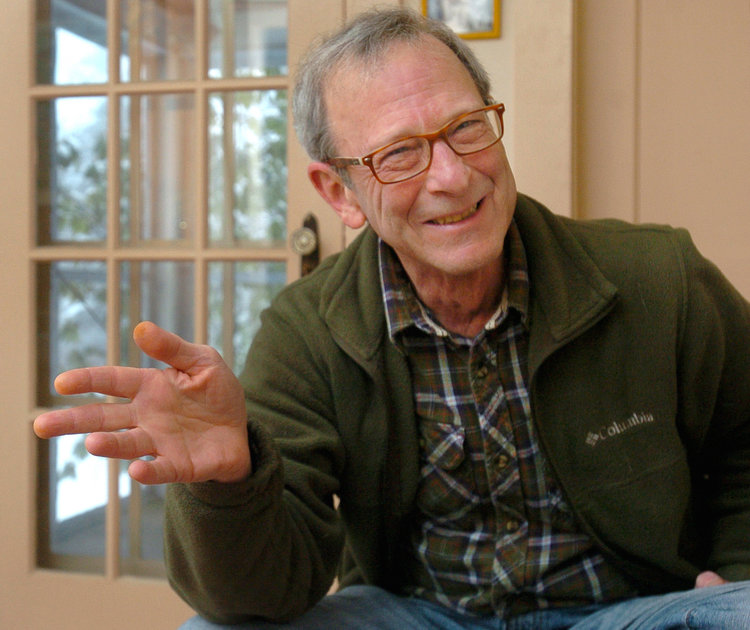Available Now from Press 53
When did you first encounter poetry? How did you discover that you wanted to write poems?
I first came upon poetry in elementary school, some rhyming ditties I guess, and then, in what used to be called Junior High School, I remember having to memorize a good part of Coleridge’s “The Rime of the Ancient Mariner.” Another, more salient influence, had to do with an older brother who got me infatuated with writings of the “Beat Generation.” And from an early age I identified with outcasts, rebels, and all those discriminated against or ignored by our government. I discovered the raw power of words that was somewhat equal to the blues and jazz I listened to. After the first time I made love I decided that I’d be a poet.
Do you have a writing routine? A favorite time or place to write?
My routine is pretty random. I might write at any time of the day or night. A favorite place to write is in my home, usually gazing out an open window, watching birds eating at the feeders. Or black bears also eating at and usually destroying the feeders.
Where do your poems most often come from—an image, a sound, a phrase, an idea?
My poems come from thin air…and from the news of the day…from other poets I’ve read…sometimes from a phrase stuck in my mind or even a single word… something I’ve seen…very often a memory.
Which writers (living or dead) do you feel have influenced you the most?
Walt Whitman, the “Beats,” Robert Creeley, Allen Ginsberg, Lucille Clifton, Geraldine Brooks, William Stafford, William Carlos Williams, Nazim Hikmet, Sharon Olds, William Matthews, Stephen Dobyns, Pablo Neruda, Jerry Stern, and on and on.

Tell us a little bit about your new collection: what’s the significance of the title? Are there over-arching themes? What was the process of assembling it? Was is a project book? etc.
Other than finding beauty in its hidden places and trying to make sense out of an absurd world, there is no over-arching theme to either of my two collections of poetry. They are collages, if you will, of life experiences. I had a chapbook come out in 1977 and then, over 35 years later, Dreaming of the Rain in Brooklyn appeared. Now in 2018, Googootz and Other Poems has been published. I’m hopeful that the next book will see the light of day in a shorter time.
The title of the new work comes from the poem Googootz, which recounts a tale regarding a job I held for many years. The word has a number of meanings: a term of endearment; a zucchini; a slang term for a useless person; the flower of a zucchini or squash plant which is the definition that fits the poem.
Putting the book together was a process of assemblage and carpentry. It took quite a long time to order the poetry and revise and revise and revise the poems.
“PROVINCETOWN,” a poem from Googootz and Other Poems
There were mulberry limbs twined with mimosa branches leaning close
to the back door. Stretching, I could barely reach the fruit hanging high above a
narrow path. Mulberries for breakfast, mulberries with lunch, our teeth stained
that whole week. Each of us believed the other was dreaming. Imagination
wasn’t necessary. Late afternoons we took the small, crooked side streets
leading to the harbor, passing scrolled awnings and furled flags, porches
intaglioed by purple morning glories. A raft of eider ducks with their black bellies
and white backs visible from the bleached wharf. It was July 4th, nearing dusk,
when we joined the promenade up Commercial Street. Couples arm-in-arm: men
with men, women with women, women with men. The smell of mud at low tide. A
street musician played a Bach suite on her viola, an elegantly dressed woman
sang from Carmen in faulty French. Down one clamshell alleyway, I thought I
heard a bobwhite’s whistled call, perhaps answering those first explosions. Long
Point Light and Pilgrim Monument always in the distance, the mast of the
schooner, Rose Dorothea, threatening to rise through the library steeple. And at
every open space between crowded shops, at every corner, fireworks erupting.
The childrens’ moon at first quarter as the sun dropped lower. Already the days
beginning to shorten. Once we reached the West End breakwater, we forgot
everything. That’s what we told each other. Imagination wasn’t necessary. Each
of us believing the other was dreaming. Then we swung round and strolled back,
stopping in a painter’s studio where a show was being hung. The artist said, I
don’t want to know what I’m painting. But every move she’d made had intention,
every step we took, the bleeding berries, bobwhite calling its mate, light tumbling
off runged constellations, each star in the ladder tipping over, spilling song, filling
the darkness that finally stretches over land’s end, the bursting flame over half
the world.

Howie Faerstein’s first book of poetry, Dreaming of the Rain in Brooklyn, was published in 2013 by Press 53. A second collection, Googootz and Other Poems, came out in September, 2018. His work can be found in numerous journals including Great River Review, Nimrod, CutThroat, Off the Coast, Rattle, upstreet, Mudfish and on-line in Gris-Gris, Peacock Journal, and Connotation. Considering himself an “adjunct emeritus,” he presently volunteers as a citizenship mentor at the Center for New Americans and is Associate Poetry Editor of CutThroat, A Journal of the Arts. After living in Brooklyn for fifty years, he now lives in Florence, Massachusetts.
